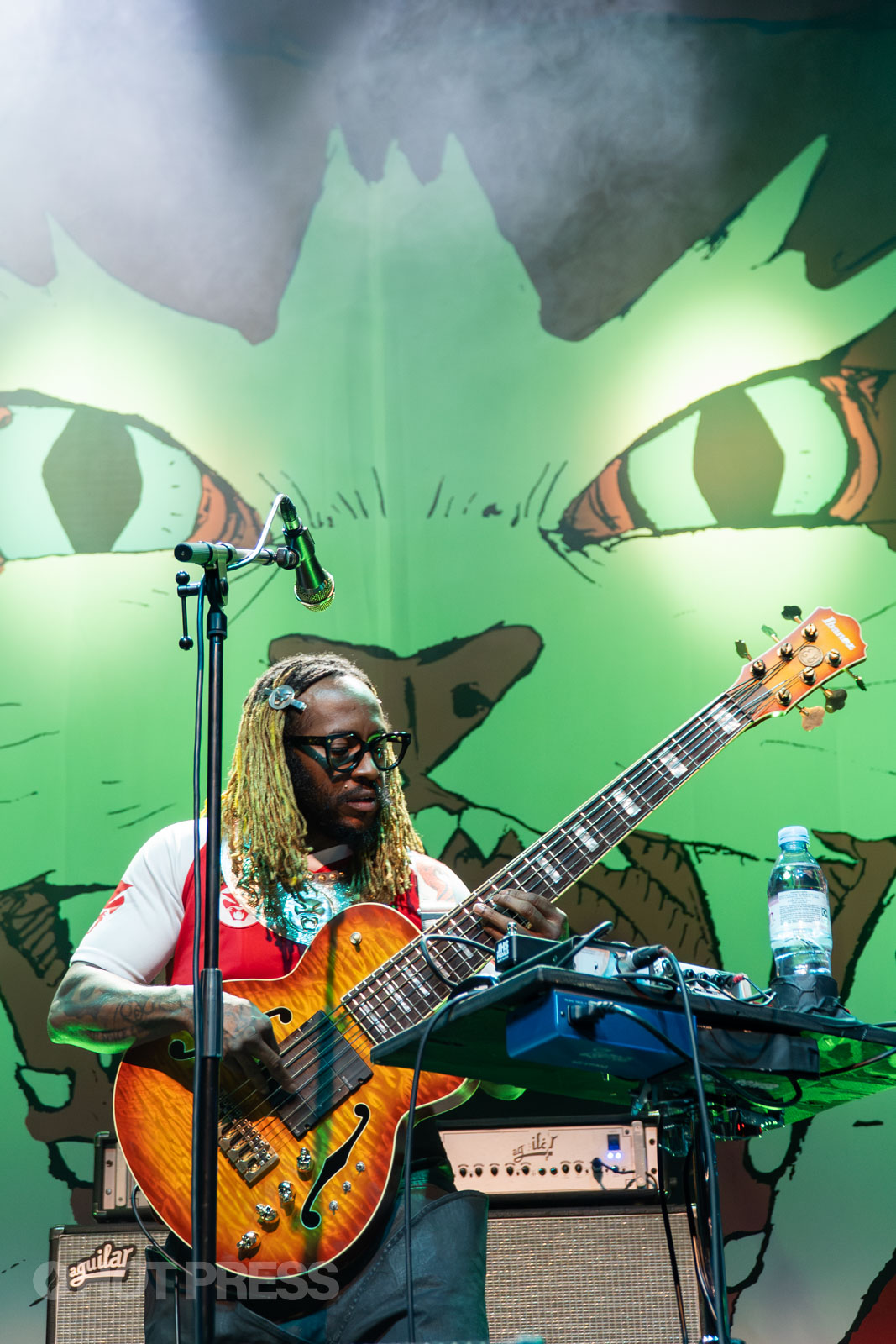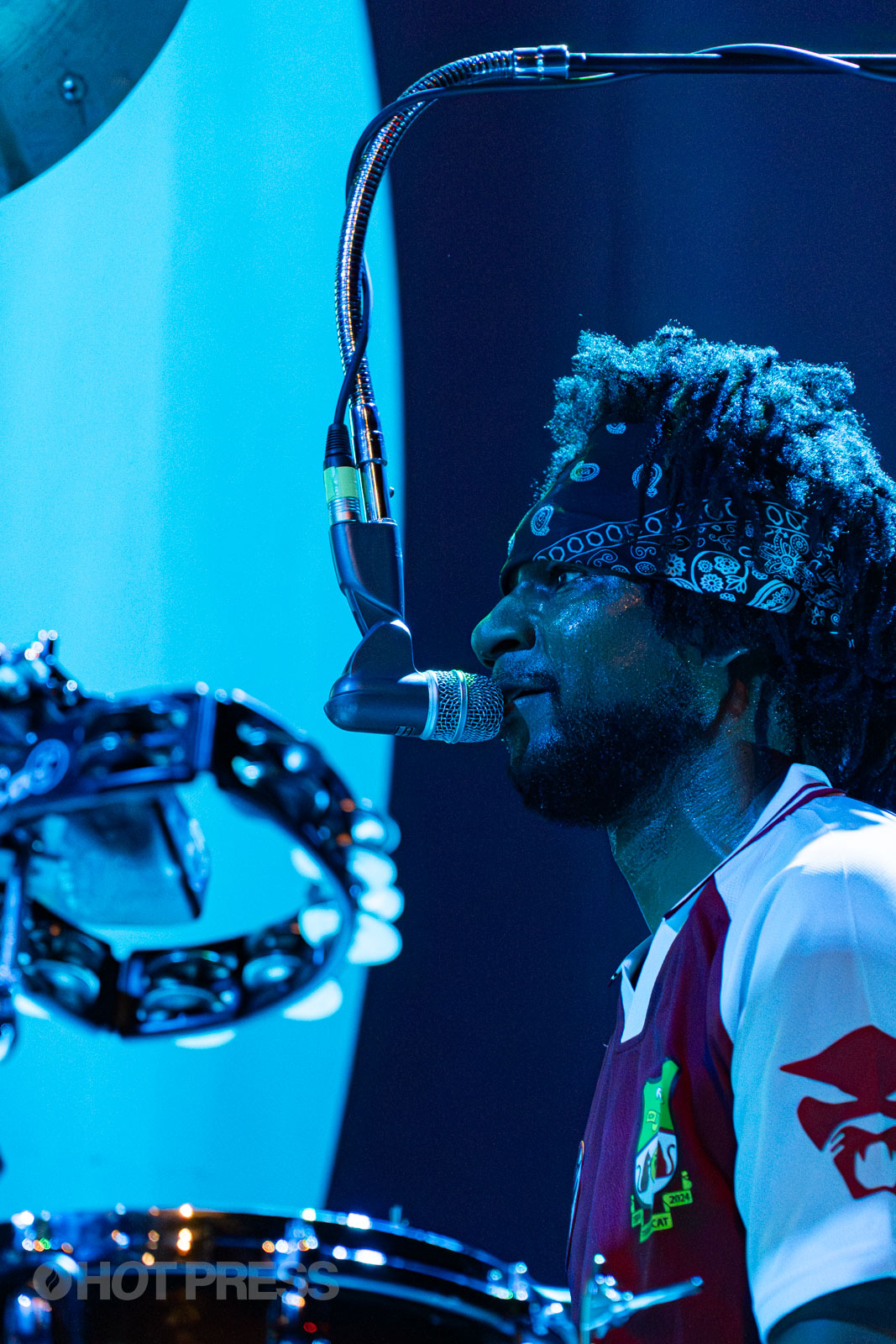- Music
- 27 Mar 24
Live Report: Thundercat stuns at Vicar St

A legendary sonic polymath, Thundercat's mastery of bass and his iconic stage presence were on full display at Vicar St last night.
Thundercat has long been a unique figure in contemporary music. His off-kilter sense of humour and a folkloric investment in anime translate seamlessly into his earth-shattering mastery of the six-stringed bass. His authentic artistry has made him an undeniable success, collaborating with the likes of Flying Lotus, Kamasi Washington, Tame Impala, Kendrick Lamar and his good friend, the late Mac Miller, among countless appearances on songs and albums across all genres.
As one of the most renowned living bassists, a certain mythology surrounds Thundercat: that he is the creature of a strange, frenzied universe of jazz-funk improv and random streams of psychedelia, wherein the harrowing crashes headlong into the whimsical. As it turns out, these characteristics were on full display last night at Vicar St., where he played to a sold-out audience.
 Thundercat at Vicar Street, Dublin, 26 March 2024. Copyright Bailey Shropshire/hotpress.com
Thundercat at Vicar Street, Dublin, 26 March 2024. Copyright Bailey Shropshire/hotpress.comAs the lights dimmed, the crowd's excitement crescendoed before Thundercat and his band casually loped on stage in matching rugby shirts. Glancing at his bandmates, Thundercat almost looks surprised at their outfit coordination, almost as though it happened by way of serendipity. "God, we look like a band, don't we?" he laughs. Wielding his iconic semi-hollow, six-string bass, Thundercat seems elated at the rapturous applause, his stage presence as infectious as his incomparable sonic prowess.
The three-piece ensemble - Dennis Hamm on keys and synth, Justin Brown on drums and Stephen Bruner, aka Thundercat, on bass - seemed more like family than colleagues, with an overtly palpable chemistry. That kind of connection is vital for the kind of stuff they're playing.
 Thundercat's Drummer at Vicar Street, Dublin, 26 March 2024. Copyright Bailey Shropshire/hotpress.com
Thundercat's Drummer at Vicar Street, Dublin, 26 March 2024. Copyright Bailey Shropshire/hotpress.comAfter a brief welcome, Thundercat immediately rips into a bass solo so astonishingly off the charts that silence briefly falls over the crowd, whose jaws are to the floor. It wasn’t even two minutes into his set before the music spun out of control.
Imagine: you’re going 190 km/h down a deserted road in a vintage sports car, painted bright orange. The dice suspended from the rear view mirror rattle against the velocity. In the corner of your eye, blue and red lights flash in the mirror reflection, sirens fill the air. Then, with a brick on the accelerator, you speed off, narrowly escaping the call of reality. That’s what Thundercat’s show was like: wild, fast-paced and fortuitous.
Here's how it worked. Thundercat would kick off songs, the cheers heightening at the familiar ones, before subverting expectations entirely by launching into paroxysms of ad-libbed bass. The stretched improvisations tend to have greater density and direction: they seem in a constant state of building, with every moment increasingly more fevered, as the three members veer off on their own sonic tangents, but never loosening their grip on the core momentum.
 Thundercat at Vicar Street, Dublin, 26 March 2024. Copyright Bailey Shropshire/hotpress.com
Thundercat at Vicar Street, Dublin, 26 March 2024. Copyright Bailey Shropshire/hotpress.comThose frenetic bass runs, for which Thundercat is revered and lauded, are stand-out moments. Elastic growls that sit on active fault lines, while maintaining smooth fluency, arrive at the intersection of artistry and spirit. He’s not merely playing the instrument, it becomes him.
There’s an obvious tension between the band’s inclination to improvise and the need to heed the call for some of the fan favourites. Song requests are called out, many of them being Thundercat’s ‘pop’ hits. This is not to say that the bouts of improvisation are unwelcome – in fact, they are met with an ocean of roars. But once those definitive tracks roll in, they’re greeted like the product of some mythological gods.
As such, the crowd reaches a fever pitch as he breaks into new classics such as ‘Dragonball Durag', from his 2020 album It Is What It Is.
At its finest, Thundercat’s cross-pollination of jazz, funk and electronic music is positively otherworldly, genuflecting at the altars of George Clinton, Herbie Hancock, Flying Lotus and a handful of others. His technical mastery of the bass climbs to the threshold where absurdity and divine providence meet: watching him perform feels like witnessing an exorcism and someone in the throes of a manic episode all at once. And yet, he plays so effortlessly, weaving in and out of improvised runs without apparently breaking sweat.
 Thundercat at Vicar Street, Dublin, 26 March 2024. Copyright Bailey Shropshire/hotpress.com
Thundercat at Vicar Street, Dublin, 26 March 2024. Copyright Bailey Shropshire/hotpress.comPossibly one of the most unforgettable aspects of Thundercat’s presence is his unique sense of humour, which is apparent on many of his recordings. The hilarity is on full display as he bursts into 'A Fan's Mail (Tron Song Suite II)', a smooth-as-molasses track on which he considers how much better life would be as a cat. Under his meowing and falsetto yearning, the song's groovy skeletal undercarriage is alive with vibrant complexities. The fleet-fingered virtuoso keeps the audience purring as he descends into a vortex of improvised chaos, his bass whimpering and yowling in conversation with the jackhammering percussion and warbling keys.
The audience is even more elated when, in-between songs, he announces new material in the works: "I have been working on a new album."
 Thundercat at Vicar Street, Dublin, 26 March 2024. Copyright Bailey Shropshire/hotpress.com
Thundercat at Vicar Street, Dublin, 26 March 2024. Copyright Bailey Shropshire/hotpress.comThundercat closes out the night with his evergreen smash-hit 'Them Changes'. From the iconic first lines – "Nobody move, there's blood on the floor. And I can't find my heart" – the crowd accompanies the singer, belting the song out, word for word. The resplendent finale falls just short of levelling the place entirely with the utter physical weight of its swamp-plunging basslines and claustrophobic profile that builds and releases with fluidity. Put plainly, it is a tremendous sight to behold – and a magnificent noise to hear.
With Thundercat, a review can only barely scratch the surface. This bass-man really must be experienced live. A word of advice before he returns to Vicar St on 16 April: run, don't walk, to the box office.
RELATED

- Music
- 16 Feb 24
Paul McCartney reuinted with lost bass guitar after 51 years

- Music
- 14 Dec 23








